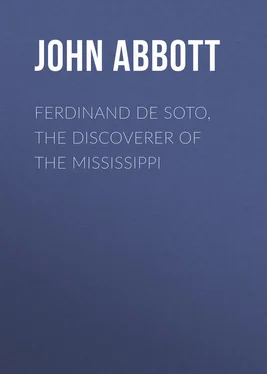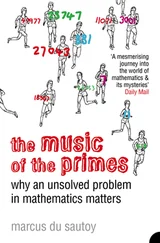John Abbott - Ferdinand De Soto, The Discoverer of the Mississippi
Здесь есть возможность читать онлайн «John Abbott - Ferdinand De Soto, The Discoverer of the Mississippi» — ознакомительный отрывок электронной книги совершенно бесплатно, а после прочтения отрывка купить полную версию. В некоторых случаях можно слушать аудио, скачать через торрент в формате fb2 и присутствует краткое содержание. Жанр: foreign_antique, foreign_prose, на английском языке. Описание произведения, (предисловие) а так же отзывы посетителей доступны на портале библиотеки ЛибКат.
- Название:Ferdinand De Soto, The Discoverer of the Mississippi
- Автор:
- Жанр:
- Год:неизвестен
- ISBN:нет данных
- Рейтинг книги:3 / 5. Голосов: 1
-
Избранное:Добавить в избранное
- Отзывы:
-
Ваша оценка:
- 60
- 1
- 2
- 3
- 4
- 5
Ferdinand De Soto, The Discoverer of the Mississippi: краткое содержание, описание и аннотация
Предлагаем к чтению аннотацию, описание, краткое содержание или предисловие (зависит от того, что написал сам автор книги «Ferdinand De Soto, The Discoverer of the Mississippi»). Если вы не нашли необходимую информацию о книге — напишите в комментариях, мы постараемся отыскать её.
Ferdinand De Soto, The Discoverer of the Mississippi — читать онлайн ознакомительный отрывок
Ниже представлен текст книги, разбитый по страницам. Система сохранения места последней прочитанной страницы, позволяет с удобством читать онлайн бесплатно книгу «Ferdinand De Soto, The Discoverer of the Mississippi», без необходимости каждый раз заново искать на чём Вы остановились. Поставьте закладку, и сможете в любой момент перейти на страницу, на которой закончили чтение.
Интервал:
Закладка:
"A good action deserves better reward than verbal acknowledgment. While it was not in my power to make any suitable recompense to you for saving my life, I did not attempt to offer you any. But the time has now come when I can give you some substantial evidence of my gratitude. I can now inform you that your life is now in no less danger than mine was when you rescued me from the Indians."
De Soto replied: "My good friend, though I do not profess to be a thorough believer in your prophetic art, I am no less thankful for your kind intentions. And in this case, I am free to confess that your information, from whatever source derived, is confirmed in a measure by my own observations."
"Ferdinand De Soto," said the astrologer with great deliberation and solemnity of manner, "I think I can read the page of your destiny, even without such light as the stars can shed upon it. Be assured that the warning I give you does not come from an unearthly source. But if any supernatural confirmation of my words were needed, even on that score you might be satisfied. While comparing your horoscope with that of my departed friend Vasco Nuñez, I have observed some resemblances in your lives and fortunes, which you, with all your incredulity, must allow to be remarkable. Nuñez and you were both born in the same town; were both members of noble but impoverished families; both sought to ally yourselves with the family of Don Pedro, and both thus incurred his deadly resentment."
"These coincidences are certainly remarkable," replied De Soto; "but what other similarities do you find in the destinies of Nuñez and myself?"
"You are a brave man," replied M. Codro, "and you are too skeptical to be much disturbed by the prognostications of evil. I may therefore venture to tell you that according to my calculations, you will be in one important event of your life more happy than Vasco Nuñez. It seems to be indicated by the superior intelligences, that your death will not be in the ordinary course of nature; but I find likewise that the term of your life will be equal to that which Nuñez attained. When I consider your present circumstances, this appears to me to be the most improbable part of the prediction."
Nuñez was forty-two years old at the time of his death. This gave De Soto the promise of nearly twenty years more of life. Reverently he replied, "I am in the hands of God. I rely with humble confidence on his protection."
"In that you do well," rejoined M. Codro. "Still it is your duty to use such human means as may be required to defend yourself against open violence or fraudful malice."
De Soto thanked the astrologer for the caution he had given him, and as he reflected upon it, saw that it was indeed necessary to be constantly on his guard. As time passed on Don Pedro became more undisguised in his hostility to De Soto. Ferdinand and Isabella exerted all their ingenuity to correspond with each other. Don Pedro had been equally vigilant in his endeavors to intercept their letters; and so effectual were the plans which he adopted, that for five years, while the lovers remained perfectly faithful to each other, not a token of remembrance passed between them.
These were weary years to De Soto. He was bitterly disappointed in all his expectations. There was no glory to be obtained even in victory, in riding rough-shod over the poor natives. And thus far, instead of victory attending the Spanish arms, defeat and disgrace had been their doom. Moreover, he was astonished and heartily ashamed when he saw the measures which his countrymen had adopted to enrich themselves. They were highway robbers of the most malignant type. They not only slaughtered the victims whom they robbed, but fired their dwellings, trampled down their harvests and massacred their wives and children.
The most extravagant tales had been circulated through Europe respecting the wealth of the New World. It was said that masses of pure gold could be gathered like pebble stones from the banks of the rivers, and that gems of priceless value were to be found in the ravines. De Soto had been now five years on the isthmus of Darien, and had acquired neither fame nor fortune, and there was nothing in the prospect of the future to excite enthusiasm or even hope.
There was quite a remarkable man, made so by subsequent events, under the command of Don Pedro. His name was Francisco Pizarro. He was a man of obscure birth and of very limited education, save only in the material art of war. He could neither read nor write, and was thus intellectually hardly the equal of some of the most intelligent of the natives. We have briefly alluded to him as entrusted with the command of one portion of the army in the inglorious expedition against Uracca. De Soto had very little respect for the man, and was not at all disposed as a subordinate officer to look to him for counsel. Don Pedro, however, seems to have formed a high opinion of the military abilities of Pizarro. For notwithstanding his ignominious defeat and retreat from Veragua, he now appointed him as the leader of an expedition, consisting of one hundred and thirty men, to explore the western coast of the isthmus by cruising along the Pacific Ocean.
Pizarro set sail from Panama on the fourteenth of November, 1524, in one small vessel. It was intended that another vessel should soon follow to render such assistance as might be necessary. De Soto was urged to become one of this party; but probably from dislike of Pizarro, refused to place himself under his command.
The vessel, which was soon joined by its consort under Almagro, coasted slowly along in a northerly direction, running in at every bay, and landing whenever they approached a flourishing Indian village, plundering the natives and maltreating them in every shameful way. At length they aroused such a spirit of desperation on the part of the natives, that they fell upon the buccaneers with resistless ferocity. Two-thirds of the miscreants were slain. Pizarro barely escaped with his life, having received severe wounds and being borne to his ship in a state of insensibility.
While Pizarro was absent on this ill-fated expedition, a new trouble befell Don Pedro. Las Casas, a devoted Christian missionary, whose indignation was roused to the highest pitch by the atrocities perpetrated upon the Indians, reported the inhuman conduct of Don Pedro to the Spanish government. The King appointed Peter de Los Rios to succeed him. The new governor was to proceed immediately to Panama and bring the degraded official to trial, and, if found guilty, to punishment. The governor of a Spanish colony in those days was absolute. Don Pedro had cut off the head of his predecessor, though that predecessor was one of the best of men. He now trembled in apprehension of the loss of his own head. Conscious of his deserts, he was terror-stricken.
About four or five hundred miles north of Panama there was the magnificent province of Nicaragua. The isthmus is here about one hundred and fifty miles in breadth, and the province being about two hundred miles in a line from north to south, extended from the Atlantic to the Pacific shores. Don Pedro was popular with his brutal soldiery, since he allowed them unlimited license and plunder. He resolved, surrounded by them, to take refuge in Nicaragua. Nevertheless, to render himself as secure as possible, he decided to send an agent to plead his cause at the Spanish court.
Among those rude, unprincipled adventurers, men of violence and blood, it was very difficult to find a suitable person. At length he fixed with much hesitation upon M. Codro, the astrologer. He was a simple-minded, good man; learned, though very artless. M. Codro was strongly attached to De Soto, the preserver of his life. As we have seen, he was well aware of the peril to which his benefactor was hourly exposed from the malignity of the governor. Gladly therefore he accepted the mission, as he hoped it would afford him an opportunity of conferring some favor upon his imperilled friend.
Читать дальшеИнтервал:
Закладка:
Похожие книги на «Ferdinand De Soto, The Discoverer of the Mississippi»
Представляем Вашему вниманию похожие книги на «Ferdinand De Soto, The Discoverer of the Mississippi» списком для выбора. Мы отобрали схожую по названию и смыслу литературу в надежде предоставить читателям больше вариантов отыскать новые, интересные, ещё непрочитанные произведения.
Обсуждение, отзывы о книге «Ferdinand De Soto, The Discoverer of the Mississippi» и просто собственные мнения читателей. Оставьте ваши комментарии, напишите, что Вы думаете о произведении, его смысле или главных героях. Укажите что конкретно понравилось, а что нет, и почему Вы так считаете.












